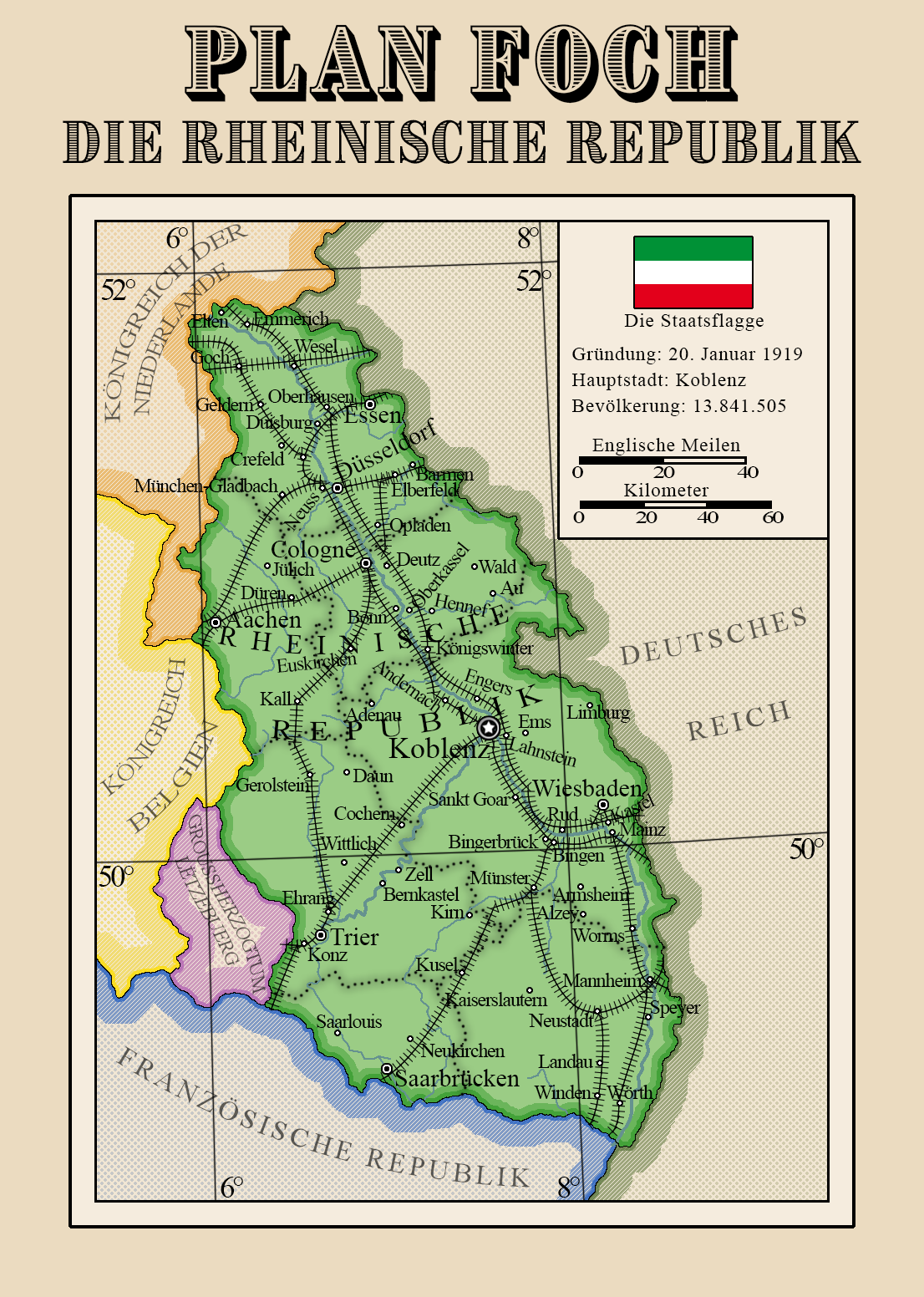Thank you Pilsudski, very cool! What does this have to do with Poland?
Such a situation makes Germany more anti-French strengthening the Polish-French alliance. And it prevents German revanchists from rearming as quickly as in OTL.
Thank you Pilsudski, very cool! What does this have to do with Poland?
I don't see anyone wanting such an ugly flag, especially when it was a symbol used by the people the Dutch, Flemish, etc fought to get away from. Some more successfully than others.
Plan Foch, in which Foch's proposition to detach the Rhineland as a separate state, to permanently weaken Germany and establish a buffer. This is all achieved at the Paris Peace Conferences via the Treaty of Versailles. This will serve as a crux of my Alternate Poland timeline.

feel free to use whichever borders you desireI like this map very much! What do you think about using these as the borders of the Workers' Republic of Germany declared during World War II in our collaborative TL "Die Alte Welt hat überlebt" (see my signature)?
Wrong thread buddy.Same flag with a new pattern. This time it looks like an alternate USA. Is there any significant number seven in the early American history?
View attachment 490009
London whining about the Channel Coast.Why stop there, when you can merge it with Belgium, Luxembourg and the Netherlands, and re-found Lotharingia? What could possibly go wrong?
That just sounds delightfully cruel.Think Russian Civil War & Chinese Warlord Era mixed into two.
Yeah.That just sounds delightfully cruel.
Had a dream that the British founded a colony known as "the Saintly Kingdom" in the Southern Cone of South America. It was radically protestant and sought to destroy Catholicism, making it effectively a Protestant Draka. Apparently it was founded as the sister colony to Australia, which itself was founded to compete with French Australia. I also recall the map of Australia being slightly different.
Could make a good map. Possibly the POD is a more persistent/radical Commonwealth England?

Here's another map from Song of the Three Eagles, the Central Powers victory TL. This is mostly just to set the background for the future:
The Friluian language doesn't quite count as Italian, more the nearby groups like the Ladins. Anyways, I would be far more concerned with how and why the British gave up so many overseas colonies. It is all a wank, as the Germans were in no position to win in the East, West, and Overseas. Doesn't matter how strong your soldiers are if you have no way of moving them.Does A-H really want more Italians?
Absolutely superb (or fuperb).
What software did you use, just out of interest? Inkscape or Photoshop?
The Friluian language doesn't quite count as Italian, more the nearby groups like the Ladins. Anyways, I would be far more concerned with how and why the British gave up so many overseas colonies. It is all a wank, as the Germans were in no position to win in the East, West, and Overseas. Doesn't matter how strong your soldiers are if you have no way of moving them.
@Thanosaekk a treaty between the Turks and Italians meant Thodes was supposed to be returned in 1912. Surely the Turks would gain at least those back
A little detail that is often ignored or misunderstood, the Ottoman Empire's capital should still be called Constantinople. But besides that I doubt Germany would gain anywhere in Africa, or for that matter maintain anywhere with British control of the sea, regardless of the truce in Europe.Here's another map from Song of the Three Eagles, the Central Powers victory TL. This is mostly just to set the background for the future:
A little detail that is often ignored or misunderstood, the Ottoman Empire's capital should still be called Constantinople.